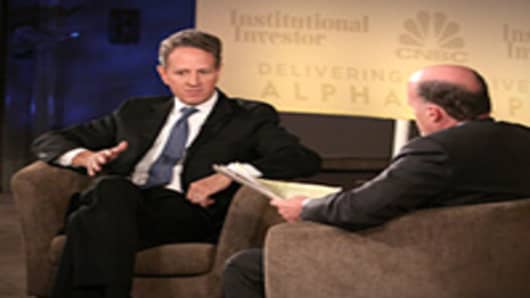The global economy is being held back in part by political problems that are complicating an
array of other forces that have conspired against growth, U.S. Treasury Secretary Tim Geithner said.
Speaking during the "Delivering Alpha" conference—organized by CNBC and Institutional Investor—Geithner said the U.S. recovery is slower than many would like and that's not being helped by chaos in Washington.
"You have this terribly damaging political dysfunction here and in Europe that leaves the world wondering whether the political system has the capacity to do the right thing," he said. "That is very damaging to confidence."
However, he expressed confidence in Europe's ability to get out of its massive debtcrisis, which has roiled global markets on fears that a collapse in a nation such as Greece will lead to another global financial meltdown. He said there is "not a chance" that Europe will have an event comparable to the implosion of Lehman Brothers in September 2009.
"We have an interest in helping them through this, but this is their challenge and they have the economic and financial capacity to meet this challenge," Geithner said. "The people who think this is beyond their (ability) are mistaken."
The comments sent stock market futures loweras investors worry that Europe will not be able to recover without intervention on a scale of what the U.S. did during the financial crisis of 2008 and 2009. Talk has intensified of a bailout along the lines of the Troubled Asset Relief Program used to recapitalize U.S. banks.
Geithner's remarks come at a crossroads for the U.S. economy.
Growth has come to a near standstill, with a net zero jobs created in August and economists predicting only limited prospects for improvement through the rest of 2011 and into 2012.
Wall Street is pressuring the Federal Reserveinto action, leading to speculation that Treasury and the Fed will work together on some reprisal of the 1960s-era "Operation Twist," in which the Fed sells short-dated debt and buys longer-term securities.
However, even that is unlikely to spur the kind of growth normally associated with an economy two years past the end of the technical recession.
The current proposals in Washington have had a difficult time gaining momentum. Geithner defended the Obama administration's positions on raising taxes for the wealthy and otherwise changing the tax structure in an effort to raise revenue and close the $1.5 trillion budget gap.
"Nobody likes to see taxes change—their taxes go up. There are no options on the table that are going to be attractive to everybody," Geithner said. "We have to make judgments about how we live within our means."
Geithner expressed some skepticism about a proposal, popular among Republicans, to repatriate corporate profits—or allowing multinationals to bring profits they make in other countries back to the U.S. without further penalties.
Rather, he said the administration's plan likely will be a combination of proposals from the Simpson-Bowles deficit reduction commission and the congressional Gang of Six. He said President Obama on Monday will propose a "detailed, comprehensive and balanced" set of ideas.
He challenged the administration's opponents to come up with something better.
"If they've got a better way to pay for the long-term stuff we'll be open to that," Geithner said. "The test for governing is, 'What's your plan, what's your strategy?' Most of the alternatives you hear today are political strategy and not real strategy. The test should be what's going to be good for growth."




